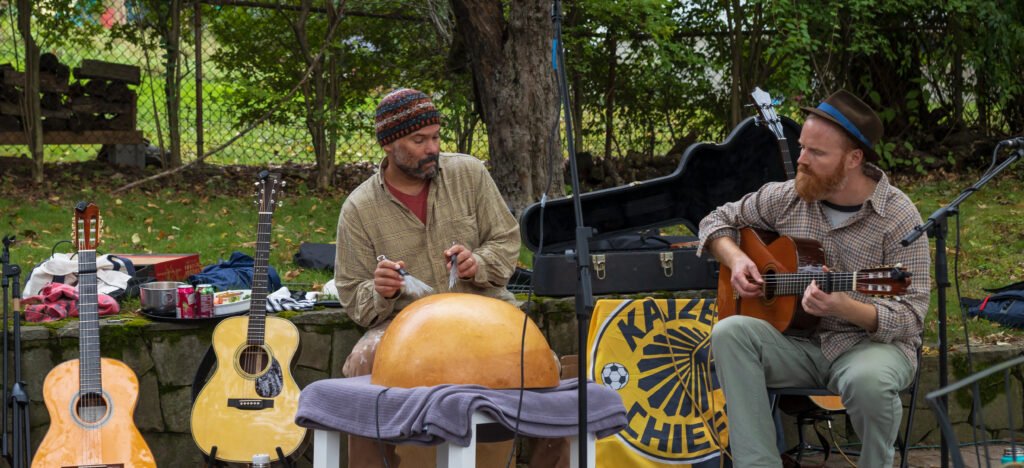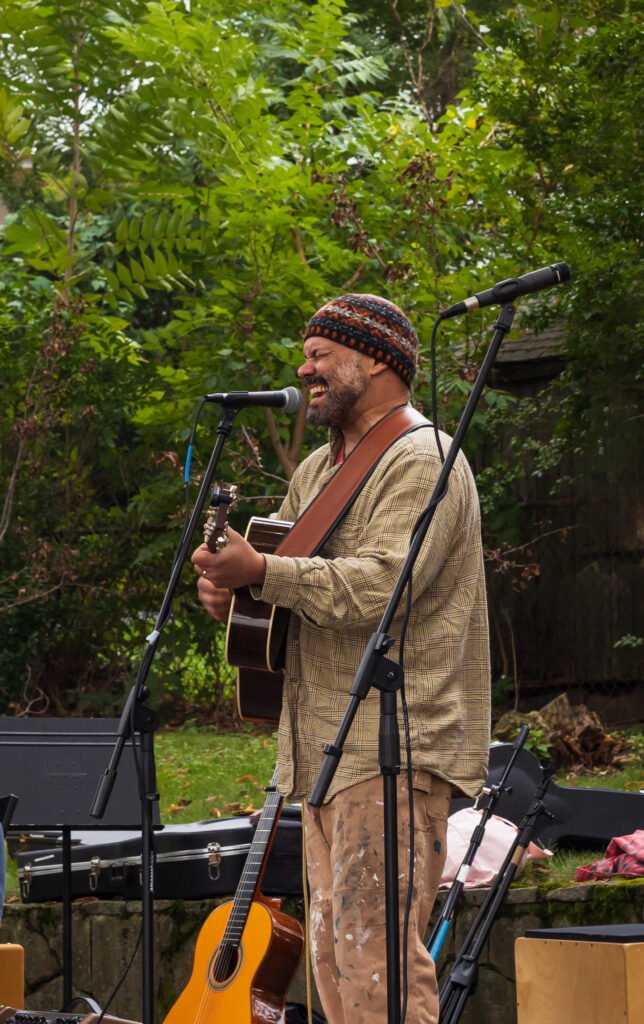Cala-Bash: Emerson Marketing Chair’s Band Performing at UnCommon Stage

When Professor Nejem Raheem is not leading the Marketing Communication as its chair, he may be playing several (unique) instruments for his band, Boundary Objects.
And come Thursday, August 29, at 1:30 pm, the trio will take the Emerson UnCommon Stage.
Raheem answered questions about the etymology of the band’s name, how being in a band makes him a better educator, the importance of work-life balance, and more.
How long have you been in the band?
Raheem: In this band, we’ve been together, in total, almost three years.
How do you know your band mate, Andrew Iliff?
Raheem: Andrew used to live across the street from me in Jamaica Plain. [Marlboro Institute Professor and Dean of Liberal Arts] Amy Ansell knows Andrew’s mom because Amy lived in Zimbabwe for a while. My wife knew Andrew’s wife’s dad through working at a nonprofit. There’s a crazy triangulation.
I used to run an open mic in Jamaica Plain, and we ended up becoming the default backup band, like if someone needed a bassist or guitarist.

What instrument do you play?
Raheem: I play guitar, bass, different percussion instruments including the cajón, and the calabash – which is like a huge half gourd. There’s a crazy tonality to it. I also play Irish whistles, and an Indian harmonium, which operates like an accordion.
The Boundary Objects’s website says you “make music at the mythical borders between Bahia and Bamako, between Barcelona and Boston armed only with guitars and a calabash.” What are the mythical borders?
Raheem: Andrew came up with that, we’re not actually located in any of those places, except for Boston. We’re blending music from West Africa, Brazil — and Barcelona was just to be alliterative as a B thing. The borders aren’t so much real as realized in the metaphor we’re building. Bahia and Bamako are really far apart, but in our music, they are connected.
Why is the band called The Boundary Objects?
Raheem: The boundary objects concept in philosophy is there is some kind of a concept, a phenomenon, that sits at the edge of a discipline. We study [and/or work in] economics, environmentalism, philosophy, law, and anthropology. It’s a concept that brings together a bunch of academic disciplines. We’re tossing this idea around that we’re middle-aged professional guys. We like the idea of being a genre-crossing outfit by bringing different styles together. We’re hoping it is appropriately geeky and not too off-putting.
You’re playing at UnCommon Stage twice this year. Where else has the band played?
Raheem: We’ve mostly been a porchfest band in Jamaica Plain, Brookline, Newton porchfests. We had a great gig at Shambhala Meditation Center in Brookline, and played a bunch of open mics. We’re super excited about the UnCommon gig. It’s a cool venue.
How’d you hear about the opportunity to play on the UnCommon Stage?
Raheem: I’m someone who always asks if I can do stuff. I see an opportunity and pursue it. Last year, when we were talking about putting the UnCommon Stage together, someone said they wanted more Emerson folks. I said, ‘Hey, I don’t know if it’s OK, I’d like to have my band play.’ So, I asked and it worked out.
What parallels can you draw between the band and your role at Emerson?
Raheem: That is a good question. There are some relatively easy ones. I have performed a couple of times at Southwick Recitals. I wrote an original ditty for it — not a song — and performed one of my own songs [for Southwick]. The Marlboro Institute has their own commencement event for students who do the interdisciplinary program, and for the last four years, I’ve played West or southern African finger-style guitar music.
I’ve also always tried to bring people together socially from different parts of the College. This is another way of doing that. I’ve invited a ton of people [to the UnCommon Stage performance]. I hope people come together, have a beer, slack off from doing important work, come together, and have a good time.
There’s not a disciplinary carry over. Maybe eventually. I have written an economics-themed pop song, and have some conservation biology themes as well, but it’s a little novelty-esque.

How does being in a band help you as an educator?
Raheem: A couple of ways. 1) It’s a counterbalance to everything I do at school. So just having such a solid articulated project as part of my constellation of work-life balance is important. I spend time with good friends of mine once a week doing stuff I love. It makes me a better person, which helps me get through stuff in a better way.
2) One thing I try to do as a teacher is submit myself to somewhat embarrassing experiences at times to remind me of things I don’t know. You can get cynical, like, ‘Kids don’t know what to ask.’ It’s not like I was so good at that at 19. Being exposed in a band in front of people shows that you make mistakes. I’m pretty good at performing in public. I have an undergraduate degree in theatre.
3) It’s also a good side hustle, and some students are deep, deep, deep, into the side hustle thing. Finding out who do I need to talk to book a show — it’s all cross-training to teach students who are not as experienced as I am.
Anything else you’d like to share about the band, yourself, Emerson, et cetera?
Raheem: I would say maybe that I know there are a lot of people at Emerson — faculty, staff, students — who do many more things than our obvious job titles or majors. It’s always lovely to see those other parts of their lives. It’s always cool to see it.
Categories